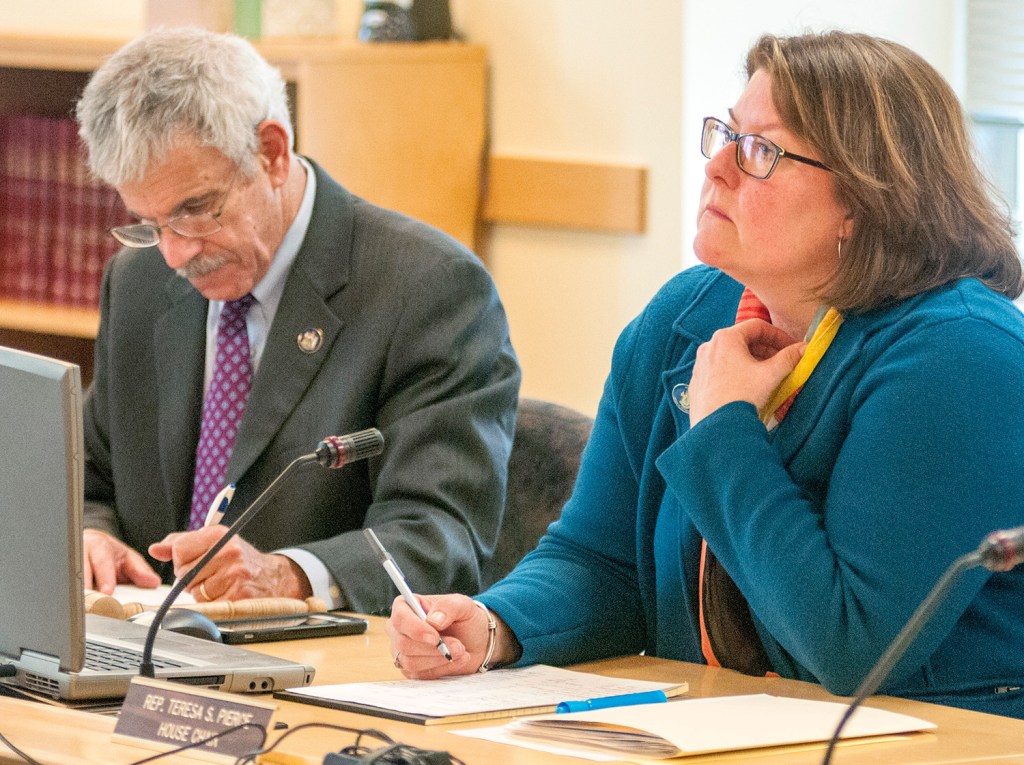Legislative leaders were cautiously optimistic after meeting Friday with Gov. Paul LePage to discuss how an adult-use marijuana bill might be changed to gain his support.
LePage met with members of the Joint Select Committee on Marijuana Legalization Implementation, which drafted the bill after Maine voters approved recreational use in 2016. The special committee is seeking compromise on various issues that led the governor to veto the measure in November.
Sen. Roger Katz, R-Augusta, Senate chairman of the special committee, characterized the meeting as a “healthy discussion.”
“It was really helpful to hear directly from the governor some of his concerns about the bill,” Katz said. “I’m not sure we’ll be able to satisfy every one of them. We agreed to keep the lines of communication open.”
Katz said the governor’s concerns largely mirrored those in his veto letter, wherein LePage said the bill set unrealistic timelines for launching the market, failed to address shortcomings in the medical marijuana program, created a confusing regulatory system, and would not generate enough tax revenue to cover the cost of regulation.
The governor also has expressed concerns that legalization conflicts with federal law, which defines marijuana as an illegal drug. An attempt to override LePage’s veto fell 17 votes short.
“Many of us feel that failure isn’t an option here,” Katz said. “It would leave us in a potentially chaotic situation that would only benefit illegal dealers in the black market.”
Rep. Teresa Pierce, D-Falmouth, House chair of the special committee, called it a “very productive meeting,” where legislators and members of the LePage administration shared concerns, discussed areas where they might find compromise and promised to keep open minds.
Other committee members at the meeting were Rep. Donald Marean, R-Hollis, and Sen. Mark Dion, D-Portland.
Also at the State House meeting were Health and Human Services Commissioner Ricker Hamilton, Administrative and Financial Services Commissioner Alec Porteous and Public Safety Commissioner John Morris.
Pierce said she heard no firm “red line” conditions from the commissioners, but they did express their concerns clearly and “seemed happy to continue the conversation.”
A new legalization bill, L.D. 1719, authored by Pierce, likely will be amended to address concerns raised by LePage and House Republicans, she said. The Legislature is expected to resume debate on the issue next week and hold a public hearing Jan. 5.
The new bill would set up a regulatory framework for the sale, production and taxation of marijuana for adult recreational use. Many Republicans oppose having a portion of marijuana sales tax revenue earmarked for cities and towns that host retail marijuana stores. They see it as a form of local-option sales tax that might encourage some towns to recruit marijuana sellers, or lead to “marijuana deserts” in some areas, where legal marijuana would not be available and black markets would flourish.
There’s also concern that the proposed 10 percent sales tax and 10 percent excise tax on retail sales would not generate revenue quickly enough to cover the cost of setting up a licensing system. Some Republicans have said the sales tax on marijuana should be a flat 20 percent or more to ensure that recreational marijuana pays for itself.
LePage and other Republicans also didn’t want the Maine Department of Agriculture to regulate production and growing operations. They want it regulated by the Department of Administration and Financial Services, which includes the Bureau of Alcoholic Beverages and Lottery Operations – the agency that regulates liquor sales.
Julie Rabinowitz, the governor’s press secretary, described Friday’s meeting as “positive and productive.”
“The governor discussed … his preference for a unified regulatory structure and uniform tax rate for both recreational and medical marijuana, essentially a single tax rate for marijuana purchase no matter the use,” Rabinowitz said in an email. “They also discussed the merits of an excise tax, which the governor also favors. Generally speaking, an excise tax is a prudent way to prevent diversion of product to the black market.”
Voters legalized adult use of recreational marijuana in 2016, allowing the possession of up to 2.5 ounces by anyone 21 and older, but did not establish a system governing retail sales and production.
The voter-passed law allows adults to grow up to six plants for their own use, but does not allow commercial production or retail sales. It also repealed a previous state law that prohibited giving marijuana away or using it as a promotional item.
In November, minority House Republicans sustained a LePage veto of a bill passed in October to establish rules for recreational sales and taxation. The measure would have set licensing requirements, a sales tax schedule and safety testing of marijuana products, among other provisions.
A moratorium on retail sales approved last January, which made no provisions for sales and excise tax collections, will expire Feb. 1.
Staff Writer Scott Thistle contributed to this report.
Kelley Bouchard can be contacted at 791-6328 or at:
kbouchard@pressherald.com
Twitter: KelleyBouchard
Send questions/comments to the editors.



Success. Please wait for the page to reload. If the page does not reload within 5 seconds, please refresh the page.
Enter your email and password to access comments.
Hi, to comment on stories you must . This profile is in addition to your subscription and website login.
Already have a commenting profile? .
Invalid username/password.
Please check your email to confirm and complete your registration.
Only subscribers are eligible to post comments. Please subscribe or login first for digital access. Here’s why.
Use the form below to reset your password. When you've submitted your account email, we will send an email with a reset code.